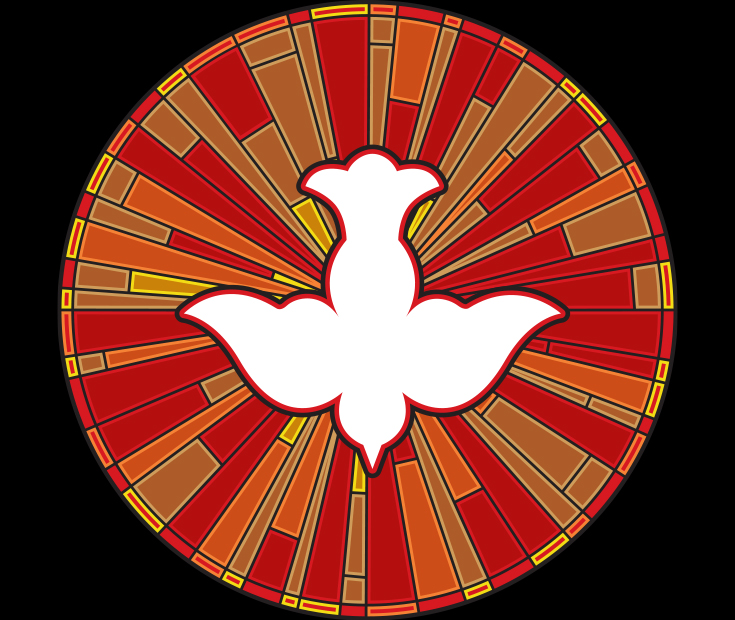Fourth Week of Advent
An Act of Trust
◀ To Week 3 To 12 Days of Christmas ▶
Download Devotional Bahasa Indonesia Mandarin Chinese (普通話)
The Sacrament of Christmas
By Howard Thurman
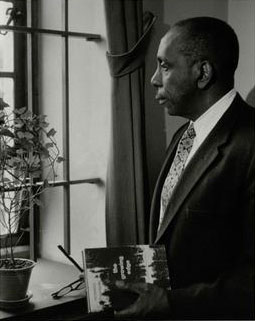
Howard Thurman From the Howard Thurman and Sue Bailey Thurman Collections, Howard Gotlieb Archival Research Center at Boston University
I make an act of faith toward all humankind,
Where doubts would linger and suspicions brood.
I make an act of joy toward all sad hearts,
Where laughter pales and tears abound.
I make an act of strength toward feeble things,
Where life grows dim and death draws near.
I make an act of trust toward all life,
Where fears preside and distrusts keep watch.
I make an act of love toward friend and foe,
Where trust is weak and hate burns bright.
I make a deed to God of all my days —
And look out on life with quiet eyes.
Reflect
The Christmas season is almost here, but as the world sprints toward Dec. 25, let us commit to staying fully present in Advent. Where joyful carols are ringing, let us continue seeking God’s silences. Where friends and family are gathering safely with virus precautions in place, let us be watching for God’s angels among strangers. Where gifts are being placed under trees, let us remember the greatest gift cannot be found in a box, but in our hearts. Let us join Howard Thurman in making the sacred act of trusting that in little Bethlehem, “our hopes and fears of all the years” will once again be met in Christ. How will you commit to a slower, more prayerful last week of Advent?
Pray
Compassionate God, despite all that is wrong in the world, you have not given up on us. You, who loved the world so much that you gave us your Son, continue to shower us with redemptive love. As we make our way to Bethlehem, the House of Bread, strengthen us for the work that is still to be done. Help us to see the opportunities this week to share the Good News of a Savior born for all humankind. And may our arms be filled with loaves of love to share as we speak of your greatness. In Jesus’ name, we pray. Amen.
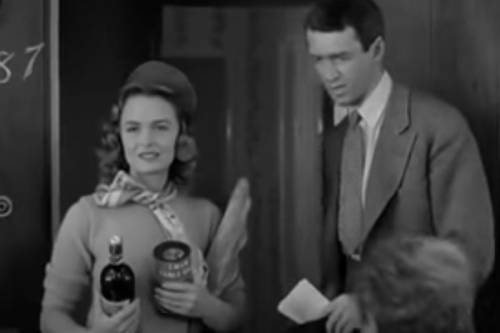 Day 22 | Fourth Sunday of Advent, Dec. 19
Day 22 | Fourth Sunday of Advent, Dec. 19
It can be a wonderful life
Sing aloud, O daughter Zion; shout, O Israel! Rejoice and exult with all your heart, O daughter Jerusalem! The Lord has taken away the judgments against you, he has turned away your enemies. The king of Israel, the Lord, is in your midst; you shall fear disaster no more. On that day it shall be said to Jerusalem: Do not fear, O Zion; do not let your hands grow weak. The Lord, your God, is in your midst, a warrior who gives victory; he will rejoice over you with gladness, he will renew you in his love; he will exult over you with loud singing as on a day of festival. — Zephaniah 3:14–18
It just wouldn’t be the holidays without watching the 1946 classic, “It’s a Wonderful Life.” It’s the story of a banker, George Bailey, who after sacrificing his dreams to help those in his hometown of Bedford Falls, questions if it had been worth it. Perhaps he should never have been born, he wonders. Clarence, the loveable, bumbling angel — seeking to get his wings — sets out on his mission to show George how wrong he is. The life he has lived is blessed. But he just doesn’t see it. The movie is timeless because of its haunting “What if?” question, which resonates in us all.
There’s one scene particularly that strikes a chord with me. George and his wife, Mary, are standing on the steps of a home welcoming its new owners. They’re surrounded by their community, which is happy that this family now has a place to call home. George and Mary present three housewarming gifts: bread, “that this house may never know hunger”; salt, “that life may always have flavor”; and wine, “that joy and prosperity may reign forever.”
It’s been 75 years since the film hit the big screen, and I wonder: What if there were more George Baileys among us? When was the last time I stood in the doorway of a home with bread, salt and wine, offering a true welcome to someone who was rejected or dejected?
Like the rest of the country, homelessness in my little state of Vermont is a growing problem, with the state legislature just signing an extension for housing the homeless in local motels till the end of the year. But what will happen in January when the temperatures really dip and the snow piles high? Who will welcome them into a home with bread, salt and wine?
And what about a loving community welcome for new refugee families?
A few years ago, a Vermont town made a big flak about not wanting to welcome refugees into their neighborhood. Today, that same town is reconsidering its anti-refugee stance. The town needs revitalization. Becoming a more welcoming and diverse community is what the town needs — at least that was the sentiment of the newspaper article I read the other day.
Homelessness and an influx of refugees coupled with all the vacant churches I see as I drive along my rural roads — five, by the way, five churches in my little area with “For Sale” signs on them — got me thinking. What if a nonprofit was started to turn those empty houses of worship into affordable housing? What if those churches that failed as “organized religion” showed people turned-off by church what God really had in mind when creating the body of Christ to provide a true refuge?
What if this Advent we do not let our hands grow weak, as the prophet Zephaniah tells us, and we become the George and Mary Baileys who welcome others into homes with gifts of bread, salt and wine? What if we really looked around and found a place for that down-on-their luck couple who is about to have a child? The world might insist that there is “no room in the inn” for them — or for the homeless or the refugee. But we know better, don’t we?
Pray
God of refuge and respite, there are so many this day who are without a roof over their heads. Even in our own communities, there are those who are on the verge of homelessness, barely making ends meet. Fill us with your creative Spirit, revealing to us all the ways in which we can ease the struggles and worries of others. And as you open our eyes to the “inns” that are vacant, open our hearts as well so that we become more loving and more generous. In Jesus’ name, we pray. Amen.
Go deeper
Spend time exploring your community, driving through streets to see where there might be a need. Ask agencies that help others what trends are emerging. Reach out to local schools to inquire what families might need. As you light the fourth candle of Advent and break a piece of your bread, think of who needs a loaf this week. Homelessness is a nationwide crisis. Learn more at endhomelessness.org
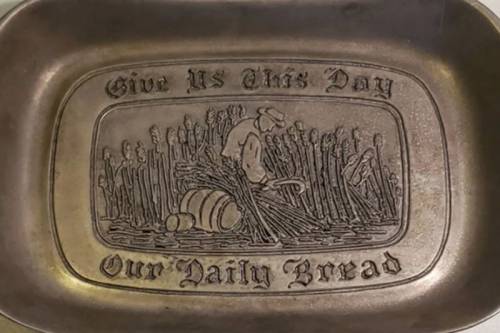 Day 23 | Monday, Dec. 20
Day 23 | Monday, Dec. 20
Our daily bread
Give us this day our daily bread. And forgive us our debts, as we also have forgiven our debtors. And do not bring us to the time of trial, but rescue us from the evil one. — Matthew 6:11–13
Like many children of the 1970s, I went through a “Little House on the Prairie” phase, reading and rereading all of Laura Ingalls Wilder’s books. From her earliest adventures living in the “big woods” of Wisconsin to her first years of married life on the unforgiving plains of South Dakota, I took it all in. I also tried to recreate her life, making rag dolls with buttons eyes and unsuccessfully churning cream into butter.
There was also one December day that I tried making maple candy that Laura mentioned in one of her books. Home from school due to a snowstorm, I busied myself boiling fake pancake syrup — a childhood staple — to pour into the snow of my New Jersey home. Rather than hardening, like it did for Laura, my father was greeted to a slushy pile of pancake syrup when he got home from work.
I continued to live vicariously through Laura’s tales of life in the mid-19th century. So, when I received for Christmas one year a bread platter with sheaves of wheat and the words “Give us this day our daily bread” engraved in the tin, I squealed with delight. It was just like the platter Laura had as a young farm wife.
Bread was an important staple in Laura’s life as it was in biblical times. Bread, in fact, is mentioned 492 times in the Bible. And each week, the faithful are reminded of bread’s importance as they pray the “Lord’s Prayer,” asking for daily bread to be given. Often, when this line is spoken, we think of food for our tables. Recently, though, my “daily bread” prayers have not been for warm, yeasty loaves. They have been for more of Jesus, the Bread of Life, who desires to be an integral part of my daily living.
It still amazes me how God’s plan for salvation was so perfectly planned: selecting Bethlehem, an insignificant village whose name means “House of Bread,” as Jesus’ birthplace, and placing the babe in a feeding trough that would have held food for animals. All of this illustrates powerfully that our hungers will be met in Christ.
Yet we are still starving spiritually, aren’t we? Perhaps we need to pray instead, “Give us this day, more of Jesus.” More Jesus and less of self would bring peace into this world where there is conflict. More Jesus and less of self would bring love where there is hate. More of the Bread of Life and less of self would bring contentment with who we are, where we are, and with what we have.
I no longer use that platter I received so many years ago for bread. Instead, I use it as my prayer platter, writing my prayers for more Jesus in my life: more Christlike actions to come from my hands, my Christ light to shine from heart, and more Christ inspired words to come from my lips.
Howard Thurman observed that “the lords of business and religion will never bring peace to the world.” Rather, it is from the “common” person — you and I — in which Christ’s peace will be known to this weary world. And so, we pray for our daily bread: more Jesus and less of self.
Pray
Provider God, you know our needs even before we utter them out loud. Help us in this time of Advent waiting to pray for more of your light and your love in our lives. Give us this day not just a yeasty loaf to ease our grumbling stomachs. Give us daily the Bread of Life — Jesus. In Jesus’ name, we pray. Amen.
Go deeper
Get a special platter or basket that you often use to serve bread and — for the rest of Advent and continuing throughout the Christmas season, which ends on Jan. 6 — use it as your prayer platter or basket, replacing actual bread with prayers to know the Bread of Heaven in a deeper, more meaningful way.
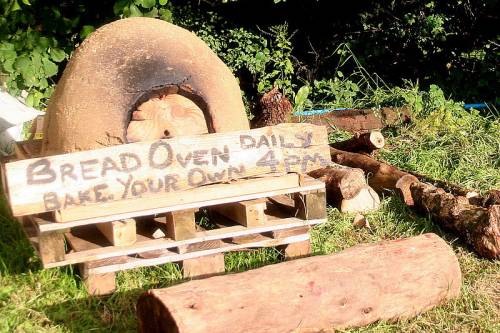 Day 24 | Tuesday, Dec. 21
Day 24 | Tuesday, Dec. 21
The communal bread oven
In those days Mary set out and went with haste to a Judean town in the hill country, where she entered the house of Zechariah and greeted Elizabeth. When Elizabeth heard Mary’s greeting, the child leaped in her womb. And Elizabeth was filled with the Holy Spirit and exclaimed with a loud cry, “Blessed are you among women, and blessed is the fruit of your womb. And why has this happened to me, that the mother of my Lord comes to me? For as soon as I heard the sound of your greeting, the child in my womb leaped for joy. And blessed is she who believed that there would be a fulfillment of what was spoken to her by the Lord.” And Mary said, “My soul magnifies the Lord, and my spirit rejoices in God my Savior, for he has looked with favor on the lowliness of his servant. Surely, from now on all generations will call me blessed; for the Mighty One has done great things for me, and holy is his name. — Luke 1:39–49
The seemingly innocent request for the keys to my husband’s pickup truck garnered a raised eyebrow from him. “Why?” he asked with great trepidation. What he really wanted to ask was, “What could his wife be up to now?” I glossed over the things that I needed to get, like bags of clay mix and firebricks from the home supply store and stones from a friend’s nearby field.
Since coming back from my 18th-century, open-hearth cooking class, I had been on a mission to create an outdoor oven with a stone base and a clay, beehive shaped dome to cook in. I was enthralled with this cooking method, sharing with him my desire to cook our Christmas meal in such an oven. What really interested me, though, was the chance to somehow cook with that “great cloud of witnesses” Paul speaks of in the Bible — to spend time on some realm with ancestors of long ago.
Connection and community — they are really what these ovens were all about. Since the dawn of time, in every culture and in every part of the world, evidence of outdoor clay ovens can be found. There are relics of such ovens in Syria, dating some 9,000 years ago. Many of these ovens were communal, built in the center of villages. Families would prepare their dough at home and then bring it to the communal ovens to be baked. To distinguish whose loaves belonged to whom, a wooden stamp of a design or initials would be pressed on top of the dough.
I sometimes think of how it was at a communal oven where joys and concerns were shared: where a new mother received encouragement, a lonely widow found companionship, and a teen was imparted morsels of wisdom from her elders.
Who knows? Perhaps during Mary’s visit to Elizabeth, young and old not only rejoiced as to what the Lord was doing in their wombs, but after embracing, the women gathered around a clay oven, baking loaves together as encouragement, companionship and wisdom were shared.
My husband gave me the keys to his truck, but I didn’t make my run to the home store that day for clay, and the stones are still in my friend’s field, untouched. I decided to hold off on building an outdoor bread oven on my property. I found a more perfect location instead: the church in which I serve.
After all, what better way to build community than inviting people to gather around an oven and bake the bread that will be blessed and broken? And as we bake, I can only imagine the stories that will be shared and the laughs that will fill the air. It will take some planning, some heavy lifting and some money. There are grants, though, to see such a project through. In 2017, in Johnson, Vermont, a community bake oven was built in the middle of town with grant money. Jen Burton, the visionary behind the oven, said she had hoped the oven, “would rekindle community around food.” It has done just that.
Pray
Communal God, it is too easy these days to shut ourselves off from others. We protect what we have. We hesitate to reach out to others either for help or to help. We fail to hear the wisdom of those who have walked before us can share. May we find in our community that space where we can gather and, in the sharing with one another, be nourished. In Jesus’ name, we pray. Amen.
Go deeper
Explore your community for where coming together around food can begin to strengthen relationships. And if you are curious about making an outdoor clay oven, here’s a fun video to watch. Go to: youtube.com/watch?v=i0foHjPVbP4
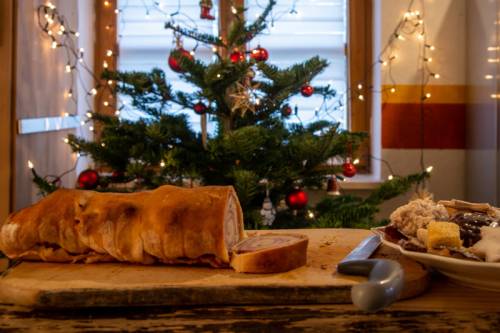 Day 25 | Wednesday, Dec 22
Day 25 | Wednesday, Dec 22
Glad surprises
The Lord appeared to Abraham by the oaks of Mamre, as he sat at the entrance of his tent in the heat of the day. He looked up and saw three men standing near him. When he saw them, he ran from the tent entrance to meet them, and bowed down to the ground. He said, “My lord, if I find favor with you, do not pass by your servant. Let a little water be brought, and wash your feet, and rest yourselves under the tree. Let me bring a little bread, that you may refresh yourselves, and after that you may pass on — since you have come to your servant.” So they said, “Do as you have said.” And Abraham hastened into the tent to Sarah, and said, “Make ready quickly three measures of choice flour, knead it, and make cakes.” — Genesis 18:1–6
Glad surprises: Howard Thurman describes them as moments in life that go beyond a clean bill of health from a doctor or when a meeting to address a conflict turns out better than one had anticipated. Glad surprises, Thurman said, are ones that carry the “element of elation, of life, of something beyond the surprise itself.”
The Bible is filled with stories of these glad surprises — those moments when God’s divine presence breaks into the ordinary lives of ordinary people with news that is deeper and more transformative than one could ever imagine.
Abraham was just minding his own business that day when he was visited by three strangers — angels of the Lord who would tell the surprising news that his wife, Sarah, beyond childbearing years, would have a baby. But before getting to that news, Abraham invites the strangers to sit, rest and eat with him. He instructs Sarah to make some bread. As they sit and dine, the news is shared. Of course, Sarah, listening from within the tent, laughs.
God’s glad surprises can do that. They can make you laugh in disbelief. They can turn our lives upside down. Think back to Mary and Joseph and how their lives changed the day when an angel told Mary the news that she would be the Christ bearer.
We are heading quickly toward the Christmas season where the world received the greatest surprise of all: Jesus. But before we enter this holy time, we need to remember that we have to be open to receiving these “surprises” from God. We must take time to listen to the angels that come to us disguised as strangers and invite them to sit and break bread with us.
I will never forget the day a stranger carrying a package in his hand — gruff in appearance and with an even gruffer Russian accent — came to my church office door when no one was around and asked to sit with me. I was a little wary but pulled up a chair for him. I was struggling with many possible life-changing decisions, none of which gave me the peace I was seeking as the green light to act. Now here was this stranger speaking to me about the twists and turns in life and how he had learned that sometimes peace in the heart is not needed to step out in faith. Sometimes, he said, you just need to move forward into the uncertainty, holding on to the one thing that is certain: God’s love.
When he got up to leave, he took the package in his hand and gave it to me. It was his wife’s “krendel,” a Russian Christmas bread filled with dried fruit. I learned that day, as I sipped my tea and enjoyed the bread, that glad surprises do happen if we keep our hearts open to all the ways God makes the impossible possible.
I will admit, though, that sometimes I long for the days when glad surprises were simply the gifts I asked Santa for as child: the surprises that waited for me wrapped in festive holiday paper under the twinkling lights of the Christmas tree. But Christmas is so much more than the gifts we give or receive. Christmas is all about God’s glad surprises, those moments when the Divine enters our days, changes our plans and moves us forward.
Pray
God, you who know the plans you have for us, for futures full of hope, may we, in our time of waiting and watching for the Christ Child, trust your perfect plans. May we not be hesitant or fearful to accept the life-changing, glad surprises you gift us with. In Jesus’ name, we pray. Amen.
Go deeper
Think of a time when a glad surprise presented itself to you. How did you feel initially about it? How did it change your life? What did it reveal to you about God’s care and grace?
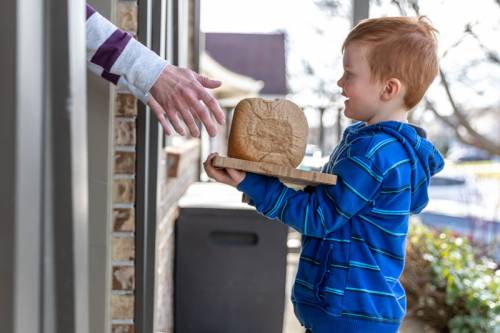 Day 26 | Thursday, Dec. 23
Day 26 | Thursday, Dec. 23
Teaching our children
You shall put these words of mine in your heart and soul, and you shall bind them as a sign on your hand, and fix them as an emblem on your forehead. Teach them to your children, talking about them when you are at home and when you are away, when you lie down and when you rise. Write them on the doorposts of your house and on your gates, so that your days and the days of your children may be multiplied in the land that the Lord swore to your ancestors to give them, as long as the heavens are above the earth. — Deuteronomy 11:18–21
The children gathered after school in the church’s kitchen. After diligently washing their hands, they listened to the guest who was joining them that day: a local bread maker who was going to teach them how to make their own loaves of bread. The loaves, though, were not just for them to slather butter and jam on. The children were also making extra to give away to others.
As the loaves cooled, filling the fellowship hall with a heavenly scent, the children were asked to think who might be blessed by receiving a loaf. The answers were many and varied, ranging from the school nurse to the post office worker, to the crossing guard who stood on the corner of the village’s one traffic light every day when school was dismissed. There was one little boy, though, who surprised everyone when he quietly whispered, “I’m giving my loaf to my neighbor. She doesn’t have much, and mom says she isn’t feeling well.”
The children then took construction paper and cut out angel wings that would serve as note cards attached to the packages of bread. The cooking class was part of a free outreach program for children called “Bake for Good.” It was created years ago by the King Arthur Baking Company, a flour company founded in Boston in 1790. The business eventually moved to Norwich, Vermont, where it has expanded way beyond flour distribution. It has become an educational center, and part of that teaching includes instructing the next generation how to not only bake, but the importance of sharing what they make.
In a world where what can be purchased for children in a store seems to define a “Merry Christmas” and where COVID-19 disruptions in the supply chain have led to crowded malls all Advent long, as people grab “Christmas” from the shelves, it has never been more important than now to heed the words of Moses in Deuteronomy. We are reminded once again to teach our children what it means to live for God. We are to model for them in words and actions the love of God. We are to instill in their young hearts, the truth that “joy to the world” is not seen in how many toys you have. Joy to the world happens when they give of themselves to another — one loaf, baked and shared.
Pray
God, no matter our age, we are all your “little children” in need of being reminded every day to keep your commands, especially the one in which you ask us to love our neighbor as we love ourselves. May we show the world that love today by the healing words we speak and the helpful actions we take. In Jesus’ name, we pray. Amen.
Go deeper
Is there an opportunity in your church to offer a children’s bread making class, using the opportunity to teach them about Jesus as their “Bread of Life” and how to share loaves with others? Or perhaps there is a young neighbor, grandchild, niece or nephew that you can invite to make bread with over the Christmas season?
 Christmas Eve | Friday, Dec. 24
Christmas Eve | Friday, Dec. 24
Searching for angels
In that region there were shepherds living in the fields, keeping watch over their flock by night. Then an angel of the Lord stood before them, and the glory of the Lord shone around them, and they were terrified. But the angel said to them, “Do not be afraid; for see — I am bringing you good news of great joy for all the people: to you is born this day in the city of David a Savior, who is the Messiah, the Lord. This will be a sign for you: you will find a child wrapped in bands of cloth and lying in a manger.” — Luke 2:8–12
Christmas Eve has always been a night when I strain my eyes looking toward heaven for the unfurling of angels’ wings. It has always been a night when, after the world has finally quieted in slumber, I step outside in the frigid night air, hoping beyond hope to hear the angels’ song telling the lowly shepherds that hope has broken into their hard lives.
So, it should come as no surprise that one of my favorite hymns is “Hark, the Herald Angels Sing.” And every time I sing with pride out of tune, I pause at the line, “risen with healing in his wings.” Now Jesus doesn’t have wings; nor is he an angel. That is correct. But when Charles Wesley, one of the founders of Methodism, penned the lyrics to this beloved Christmas song in the early 1700s, he could have been thinking of the Hebrew world “kanaph,” which refers not only to angelic wings, but to “the hem of a garment.” Risen with healing, thus, echoes the story of the woman who found healing from her many years of hemorrhaging by just touching Jesus’ hem.
For as long as I can remember, the cry for healing was always on my lips — that is, healing for my brother who is “special.” Every Christmas Eve, I would search for the angels to announce that healing and hope had arrived for my brother.
My brother is in his 60s now and still lives with my aging parents. There have been no plans put into place for how to care for him when the day comes that they can no longer do it. That day is drawing closer. And I worry. I cry. I reach out to God, but my hands seem to grab nothing but empty air.
There’s a fountain in New York’s Central Park known as the Bethesda Fountain, or it is sometimes called “Angel of the Waters.” Designed by Emma Stebbins in 1868, making her the first woman to receive a commission for a major work, the fountain measures 26 feet high by 96 feet wide. At the fountain’s center is an 8-foot bronze angel who stands above four cherubim that represent health, purity, temperance and peace. The fountain gets its name from the Scripture story of how those who came to the waters that had been stirred by an angel would find healing.
When I lived in Manhattan, I would visit the angel often. I guess that I was looking for healing with one particularly painful memory. We were children visiting Central Park with my parents. After stopping by the zoo and the rowboats, we came upon the angel. My brother and I began to run to the edge of the fountain to get a closer look at her. My brother’s coordination, though, was not the best. He stumbled and fell.
The crowds looked on as he cried. I, being just a child, was embarrassed that my special brother made a scene out in public yet again. My parents looked sad as they rushed over to him. Before they reached him, though, a woman seemed to come out of nowhere and hunched over my brother, calming him with a smile while wiping his tears. He never reached the fountain’s waters, but healing of the heart took place that day: his heart, mine and my parents’ hearts. We were not alone. Angels were among us.
Perhaps this year I need to stop searching the Christmas Eve skies for angels. Perhaps I need to stop straining my ear for their heavenly song. Perhaps I need to realize my brother does not need healing from Jesus’ “wings.” He is perfect just as he is. More importantly, the angels I have been seeking are already here, swooping in when help is needed the most. And they look a lot like you.
Pray
God of salvation, on this holy night when angels sing of the arrival of our Savior, may we listen for the songs of the angels that are already among us. May we hear the words of hope, love, peace and grace that come from friends, loved ones and even strangers. May we rejoice knowing that healing mercies abound. Yes, glory forever to our newborn King! In Jesus’ name, we pray. Amen.
Go deeper
Whatever plans you have for Christmas Eve, take time to quietly light the middle candle in the Advent wreath, which is the Christ candle. If you don’t have an Advent wreath, then light one candle to represent the light of Christ that is now in the world. As you watch the flame flicker, think of that babe in the manger. Give thanks for how, through him, you have been nourished and healed.
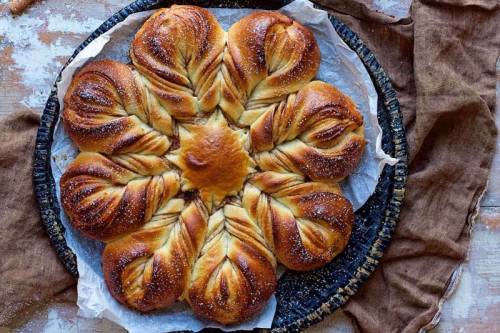 A Cinnamon Christmas Star Bread
A Cinnamon Christmas Star Bread
What better way to usher in the Christmas season than with a pull-apart cinnamon bread shaped like a star. As you enjoy it with your family — or give as a gift — reflect on the star that shone the night Jesus was born. Go to: kingarthurbaking.com/recipes/cinnamon-star-bread-recipe

